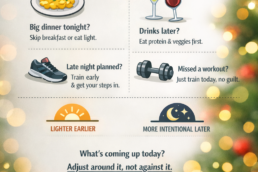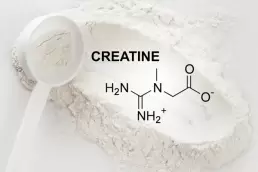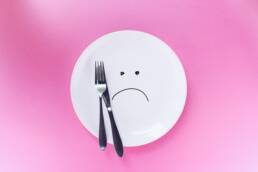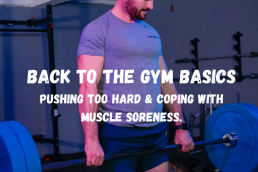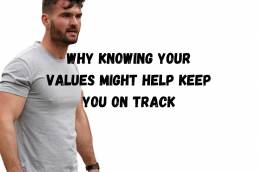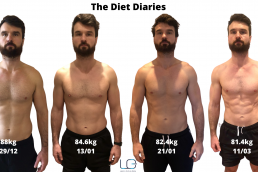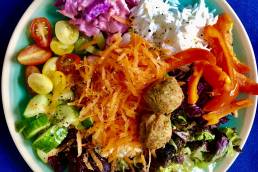17th December 2025
Your Holiday Survival Guide
Your Holiday Survival Guide
The holidays are busy.
Social plans multiply.
Food is everywhere.
This is usually where routines slip.
Training drops off.
Meals become reactive.
People write the whole period off.
“I’ll deal with it in January.”
“I’ll reset in the new year.”
“It’s only a few weeks.”
That thinking feels harmless in the moment.
Ideally, we want to avoid this way of thinking.
The aim isn’t perfection.
It’s control.
It’s about staying steady during the messiest weeks of the year so January feels like a continuation, not a rescue mission.
You don’t need to do everything.
You just need to keep doing something.
If anything, we want to be imperfectly consistent.
These six strategies are designed for real life, not ideal conditions.
- Eat Slowly. Stop at “Satisfied”
This is the simplest and most effective tool.
When you slow down, two things happen.
First, your body catches up.
It takes around 15 to 20 minutes for fullness signals to reach your brain.
If you eat fast, you overshoot.
Second, enjoyment increases.
You taste your food.
You feel content sooner.
You stop chasing that “too full” feeling.
This means you can enjoy festive meals without guilt or regret.
Try this at your next meal:
Put your fork down between bites.
Take a breath before going back in.
Finish feeling comfortable, not stuffed.
Ask yourself.
Did I enjoy that?
Or did I rush it?
- Short Workouts Still Count
December doesn’t need hours spent exercising, but you do need to do something.
Consistency matters more than intensity (one of my favourite quotes).
A few short workouts each week will:
Maintain strength
Protect habits
Support energy and mood
Even 20 to 30 minutes is better than the workout you didn’t do.
Let’s not get into the habit of “if I can’t do it all, then I won’t bother” or “I’ll wait for when I can.”
Remember, we do this more for our own mental wellbeing than anything.
Ask yourself.
What’s the minimum you can do between now and the new year and still feel like yourself?
Momentum is everything.
And it doesn’t take much to keep things ticking over.
- Plan for Eating on the Go
December is a killer for routines.
More travel.
More late nights.
More of that feeling of having no control over what you’re eating because you’re out or other people are cooking.
We might not always have control of what’s in front of us, but we always have control over what we put into our bodies.
That’s where decisions slip, because we sometimes tell ourselves we don’t have control when we do.
If you are away from home, think forwards by planning backwards.
Examples that work:
High-protein snacks or shakes in your bag
Simple, repeatable meals in the fridge
Go-to supermarket options you already trust
This stops the “I was starving, so I grabbed whatever” spiral.
You don’t need perfect meals.
You need repeatable and predictable ones.
Something we work on with all our clients.
Ask yourself.
What’s my default option when time is tight?
If you don’t know this, you should.
Get one or two options ready and practise the habit of turning to them first.
- Use Protein Shakes Strategically
Letting yourself get overly hungry is one of the fastest ways to lose control.
That’s when overeating happens.
That’s when drinks turn into snacks.
That’s when choices become reactive.
A protein shake acts as a buffer.
High protein.
Quick to consume.
Easy when life is chaotic.
Have one earlier in the day.
Between events.
Or before a big meal if you’ve barely eaten.
You’ll arrive calmer.
Less reactive.
More in control.
Ask yourself.
Where would one shake make today easier?
- Use Portion Awareness, Not Tracking
Tracking calories over Christmas rarely works.
Meals are mixed.
Portions are unclear.
Accuracy drops.
Instead, use portion awareness.
At main meals, aim for:
A solid protein portion
Some vegetables
A sensible amount of carbs or fats
Then enjoy the extras intentionally.
You don’t need restriction.
You need balance.
One heavier meal doesn’t matter.
Several days of mindless eating does.
Check in with yourself.
Is this a conscious choice?
Or am I on autopilot?
- Eat More Vegetables Than You Think You Need
Vegetables do a lot of work this time of year.
They support:
Fullness
Digestion
Energy
Mood
They make rich meals easier to handle.
The key is preparation.
Roast them.
Season them properly.
Use oils, herbs, and flavour.
They don’t need to be boring to be effective.
Anchor meals around them when you can.
Ask yourself.
Have I added anything today that helps me feel better?
The Big Picture
The holidays don’t ruin progress.
Abandoning structure does.
You don’t need extremes.
You need anchors.
Move your body regularly.
Eat with awareness.
Fuel yourself before hunger takes over.
If you can stay steady in December,
you can stay consistent any time of year.
15th October 2024
Creatine Monohydrate: What It Is and Why You Should Consider Taking It
When it comes to supplements that deliver real results in performance, strength, and overall fitness, creatine monohydrate stands at the top of the list. Whether you're new to the gym or a seasoned athlete, you've likely heard of creatine. But what exactly is it, and should you be considering it as part of your routine?
Let’s dive into why this supplement is highly recommended and how it could be the missing piece in your training.
What is Creatine Monohydrate?
Creatine is a natural substance found in muscle cells, playing a key role in producing energy during high-intensity exercise. Creatine monohydrate is the most researched and widely used form of creatine supplementation. It's naturally occurring in foods like meat and fish, but the amount you'd need to consume to match the benefits of a supplement would be quite high.
By supplementing with creatine monohydrate, you're ensuring that your body has an optimal supply of this energy-boosting compound to enhance your workouts and recovery.
The Benefits of Creatine Monohydrate
- Increased Strength and Power. If you're looking to lift heavier, run faster, or just improve overall athletic performance, creatine can help. By increasing the availability of ATP (your body’s energy currency), creatine provides that extra push during intense exercise, leading to strength gains and better performance in both anaerobic and aerobic activities.
- Improved Muscle Mass. Creatine helps with muscle volumization—meaning your muscles retain water, making them appear fuller and more defined. But beyond the aesthetics, it also supports muscle growth by increasing workload capacity, helping you push through those extra reps that lead to gains.
- Better Recovery. One of the underrated benefits of creatine is its role in muscle recovery. Creatine helps reduce muscle cell damage and inflammation following intense exercise, allowing you to bounce back quicker from hard training sessions.
- Enhanced Brain Function. Creatine isn’t just for the body; it can also benefit the brain. Studies have shown it can improve cognitive function, particularly in tasks requiring short-term memory and quick thinking. This can be a great bonus, especially if you're a busy professional trying to juggle work, family, and fitness.
- Convenient and Safe. Unlike some supplements that come with long lists of side effects, creatine monohydrate is one of the safest and most studied supplements available. It's easy to use—just mix it into water or your favorite drink—and you’re good to go. It’s also very affordable, making it a great value for what it delivers.
How to Take Creatine Monohydrate
Unlike some supplements that require complex dosing strategies, there’s no need to “load” creatine by taking a high amount at first.
You can start with the recommended daily dose of 3-5 grams per day from the beginning. Taking this amount consistently will raise your creatine stores in your muscles over time, and you’ll start seeing the benefits without the need for a loading phase.
You can take creatine at any time of the day, although many people find it easiest to take post-workout or mixed into a shake.
Who Should Consider Taking Creatine?
- Strength and power athletes: If you're into weightlifting, sprinting, or any high-intensity activity, creatine can help you improve performance and get stronger.
- Endurance athletes: Creatine isn't just for power; it can also enhance recovery, helping endurance athletes push harder in training and recover faster between sessions.
- Busy professionals or parents: Creatine supports both mental and physical energy, helping you stay sharp and focused through your workouts—and your hectic day-to-day life.
- Anyone looking to improve body composition: If you're aiming to lose fat while building muscle, creatine helps preserve muscle mass during periods of caloric deficit.
Final Thoughts
Creatine monohydrate is a solid addition to your supplement routine, especially if your goals include building strength, improving recovery, or boosting overall performance. It’s backed by science, affordable, and safe for long-term use.
In the accompanying video, I’ll walk you through my personal recommendation on when and how to take creatine, and how it’s worked for both myself and my clients. As always, it’s important to listen to your body and consider consulting with a healthcare provider before adding any supplement to your routine.
Feel free to reach out if you have any questions or want help dialing in your nutrition and supplement strategy!
Fitter, Faster, Stronger.
1% Better.
Luke
Your Coach for Health & Performance
7th January 2023
Why January diets work. Just not for you.
It’s a busy time of the year for companies who have a diet to sell, something new and shiny promising you the body of your dreams, that if you follow their diet and plan you are guaranteed to shed that weight.
It’s a competitive market and they are out there right now appearing all over your web browsers, sponsored links on popular websites vying for your attention, money and insecurities with click bait headlines.
And it’s a lengthy list of diets, plans, and clubs ranging from juicing, still popular, to Keto and intermittent fasting which seems in vogue right now to the classic pyramid schemes like Herbalife.
And let’s be real intermittent fasting is a fancy word for skipping breakfast, not to say it doesn’t have its benefits but let’s just call it what it is.
It’s an industry worth billions of pounds and these companies are all out for a share of that pie.
And they know you have probably gained some weight after Christmas due to the abundance of food and guilt you are probably feeling and are at your most vulnerable.
January diets work, no doubt about it, they are all really effective at creating a calorie deficit. You go from eating food, to drinking juices, cutting out all the carbs or salads only you will lose weight.
The question, can you maintain it long-term?
If you can’t, you will unequivocally regain the weight you lose.
So before you part with your money and jump on the band wagon of another January diet it’s important to know that the single most effective diet for weight loss across the board.
Doesn’t exist.
None of them are more superior to the other and there’s tonnes of research now to support this.
What matters is sticking to it long-term, which means the most effective diet is in those who are most adherent.
So, if you are someone who has struggled losing weight, bounced from diet to diet or keep regaining any weight you lose where should you start.
You already have a diet of food and drink you regularly consume, these are your nutritional habits and behaviours, start here.
Rather than succumbing to another January diet, spend less money and more time understanding the diet you have and what you can do to improve that.
Rarely is anything drastic required to create a negative calorie deficit, its often-implementing small lifestyle changes over time that you can sustain.
It means you can still live your best life and lose weight.
For more hints and tips follow @lukegouldencoach.
20th April 2021
Back To The Gym Basics: Tips On Pushing Too Hard & Coping With Muscle Soreness.
This is all totally subjective and dependent on the person.
And that’s exactly what I say to my clients.
Assess how you subjectively feel and listen to your body.
Am I pushing too hard? Do I need to pull back?
Struggling with muscle soreness after the first few sessions back?
Be mindful of when you need to ease off and channel your energy into the basics.
Get good quality sleep.
The foundation of life.
A non-negotiable for me and essential for your recovery and ability to repair and build muscle.
Sleep also directly influences my motivation, mood, and energy when it comes to training so it’s something I don’t compromise on.
Active Recovery.
Keep on top of your steps and don’t be completely sedentary.
I would recommend some stretching or yoga in between sessions.
You’re built to move so don’t underestimate its power on your body.
Get a good amount of protein in your diet and stay hydrated.
I’m open to argument but if you want to move in a direction that is healthy, happy and feels good I would focus on the above regardless of whether you go to the gym or not.
Tips On Pushing To Hard.
Generally speaking, there are exercises in the gym that can be pushed harder than others.
I would ease into the bigger compound lifts, don’t dive headfirst into putting a heavy bar on your back (squats) or picking up a weight from the floor (deadlifts)
The risk of injury is likely to be higher with these exercises and the last thing anyone wants is an injury after so long out of the gym.
Now is a great time to focus on what you can feel, control the weight you’re lifting, create a stable body and contract through the muscles you’re trying to challenge.
Personally, it feels so great being back in the gym, lifting weights, building muscle, and feeling awesome.
It’s empowering.
Always listen to your body and get good at knowing when to ease off.
Thanks for reading & have a great day.
Luke
8th April 2021
Why Knowing Your Values Can Help Keep You Motivated With Your Health and Fitness.
Are values becoming more and more popular?
Or is it because I am spending so much more time understanding them or at least figuring out what mine are.
It’s so true that when something becomes relevant in your life you see it everywhere when before you wouldn’t have even noticed it.
Anyway, today’s article is all about VALUES!
And how knowing them can inspire and motivate us with our health, fitness and training.
If you struggle with motivation or consistency, then continue reading and hopefully this will help.
So, what are values? And do you know what your values are?
We all have them whether you recognise them or not, they are individual to us and they kinda really define how we live our life.
I have been on a personal development journey over the past 12 months and have worked so much on figuring out what mine are.
I have found purpose; drive and I guess somewhat of a reference point when maybe I struggle with my own motivation or consistency.
I hope if you read this, you will go on your own journey to discovering what you value in life and that it supports you like it has me.
Or at the very least give yourself even more reasons to train when you lack a little motivation.
And if you are anything like me life does seem to get in the way sometimes.
If I was to ask you right now what your values are would you know?
Is your career the biggest priority in your life?
Maybe you have just had some children and it’s your family?
It could be playing sport or even computer games?
Personal development, education or learning?
Holidays or travel?
Your health and fitness?
Reading or watching the tv?
It could be anything.
The best way to figure out what they might be is to ask yourself a few questions.
What do I spend the most time thinking and talking about?
Where do you invest much of your time and energy?
What do I have around me?
There are no rules with this, nothing is definite or set in stone.
And it might take some time to figure of what your values are.
And YES, they change.
In my early 20s I valued Rugby, Partying, More Rugby, More Partying, and having a job to allow me to do more of all of that.
Now that has completely changed and I value growing my business, my education, my own personal development and supporting people on a journey to a more confident them.
I have done lots of work on this, but I am very clear that this is what I value in my life.
And what I do each and every day and think about reinforces this.
So go through the above practise and start to get a clearer picture on what it is you value.
Okay, so what do our values have to do with our health, fitness and training?
Well, if we start to link the two, we can actually find more incredible and inspiring reasons to keep on track with all three.
I have no idea what your values are in your life right?
But I am pretty confident that regardless of what they are, I bet you keeping on top of your health and fitness will support you, your life and what you value?
Am I wrong?
Even if partying is one of your highest values right now.
I am confident in saying that if you put time aside to stay fit and healthy you would be able to party harder and longer through the night than if you didn’t.
I’m open to debate but I’m pretty confident you would.
Let’s use some other examples.
What if your career right now is one of your highest values and most important to you?
Or your family?
Or both?
Answer this.
How does training support you and your career? Are you a more confident person when you training? Does it help manage stress, improve sleep, energy, focus, concentration, productivity?
If your family is at the top of your values. How does training support you being a kick ass parent and/or partner? Does training enhance your mood and energy?
With my job I find that those who are more successful, more adherent and more consistent with their health, fitness and training are those who get how important it is but also how much it positively impacts their life and as a result really value time spent doing it.
Take time to go through the process yourself.
Know your values and how exercise can support them.
It might help keep you motivated and easier to put the trainers on when a little rain is predicted.
Thank you for reading, and if you have any questions please reach out.
Luke
12th March 2021
The Diet Diaries, Volume 1: Is it all worth it?
I have never had a terrible relationship with my body, in fact for the most part I think I have done okay.
Since my Dad introduced me to weights in my early teens I have almost always trained in the gym, played rugby up until I was 30 and been fit and active.
In fact, it's a key reason some 18 years later I became a personal trainer.
I like so many others have had my ups and downs with confidence and my body, but the gym always provided me with an outlet to work on myself not just physically but emotionally and mentally.
So why this feeling of underachievement with my body?
I have started to feel a little hypercritical. Maybe I’m being hard on myself.
I talk about so much about being empowered with our bodies and health but have I ever felt truly empowered with mine?
There is an underlying feeling of underwhelm, could be more and if only's.
Did I lack education? Motivation? Commitment?
Maybe I just valued other things more.
These values certainly changed when I qualified as a personal trainer in 2014.
In fact my life did.
I don't know whether it was the health and fitness industry, my own insecurities, or just the pressure to look a certain way.
Every January has been the same story. ‘This year is my year hooorah, I am going to get in the best shape of my life'.
Oh, please Luke give it a rest.
Never happens. Just a bunch of words.
In reflection it’s good to be honest and upfront with yourself.
Hold yourself accountable and take more ownership of your decisions and actions.
I’m not sure why it’s so different this time around.
I personally feel like the past 12 months has been big for me.
I have experienced a tremendous amount of growth that is hard to convey in written form.
The main difference I feel is that I I’m doing this for myself.
There is clarity on who it’s for.
Me.
Is that why so many of us struggle? Is that why I have struggled?
My why for this project feels more emotional. I’m behind the steering wheel of this and no one else.
I want to build a body and get in incredible shape, I want to see what it takes, I want to know if it’s worth it.
I have spent more time than I care to remember feeling self-conscious about my body.
I have also spent time thinking, dam I look pretty good right now.
I’m like, yeh I can see my abs in the mirror, that same mirror that always makes me look great regardless of how I feel or look.
But do you want to know when I have felt my best?
When I didn’t give a shit. When I couldn’t care less.
How do I get more of that?
So much noise, so much pressure.
Social media, the health and fitness space I work in.
Years of being surrounded by fitness professionals some in incredible shape, so many not.
Too much time wasted on Instagram.
Instagram is like a haven for anatomy defying abdominals.
The 6 pack is so 2001. It’s all about the 12 pack and a 12 inch gap between your thighs.
Men and women wearing little to nothing doing some ridiculous workout with body-fat levels so low there is no way they’d survive a winter.
What impact is this having on everyone?
I very aware of how I feel but I haven’t always been.
Maybe that’s why it’s different.
The past year has been so crazy, it’s actually ended up being one of my most transformational years.
I have been on a rollercoaster ride of personal development and feel the clearest I have ever felt.
It started with two fingers up to Coronavirus, but now it looks like the best thing to have ever happened to me personally and professionally.
So, I have decided to see if it’s all worth it.
What do I need to sacrifice? How disciplined do I need to me? What does it take?
Let’s see if getting ‘cut’ or ‘shredded’ is actually worth it.
What’s the worst that can happen?
So, a quick update, after a 6-month mentorship I hired an online coach at the start of the year and now we are really dialling it up for the next 8 weeks with a shoot booked in for early May.
I was probably kicking around 90kg after Christmas and I weighed in at 80.8 this morning.
Stay Strong. Stay Health. Keep Moving.
Luke.
21st September 2020
3 Strategies to Help You Sleep Smarter
It's likely that if I am your coach you would of at some point heard me speaking about the importance of sleep on both physical and mental health - it's such an unvalued element of life and health.
It comes from lots of time spent researching sleep after a period where I struggled with sleep myself and experienced first hand the devastating impact it can have on the body.
It has now become a non-negotiable for me.
My mission is to have a positive impact on the people I coach hence why I do my vest best to get my clients valuing and prioritising sleep.
And it's tough - I coach career-driven individuals who spend hours upon hours in front of a screen often into the early hours of the morning.
So, here are 3 strategies to help you sleep smarter you can implement into your day that I am confident will improve not only your sleep but your health.
Morning: Natural Light.
Get up and out for a morning walk and embrace the light first thing.
So many people don’t consider this to impact your sleep but exposing yourself to natural light in the morning helps with your internal body clocks.
Light is the principal control of your day-night cycle. It influences everything from sleep, metabolism and body temperature.
Not only this but you’ve managed to get some morning steps, it’ll help set you up for the day, lowers stress, you will feel like you’ve accomplished something, and it’ll help improve focus and concentration.
Afternoon: Caffeine.
Almost all of us love coffee or tea and I am no exception, but we do disregard how stimulating caffeine is.
Midday is my cut off point for coffee and this is because there is enough research out there suggesting caffeine will still be in your system as you get into bed if you continue to drink it into the afternoon.
You might be reading this saying caffeine isn’t the problem but can you go a day maybe 2 or 3 without a coffee?
Evening: Darkness is your friend.
Now we look at the very end of the day. Darkness is your friend.
If your room isn’t completely dark at night or like me you have artificial light from outside creeping through the window invest in some blackout curtains. I recently purchased some and it has made such a difference.
I challenge you to give these a try and see how you feel and I would love to know how you get on implementing the 3 strategies to help you sleep smarter.
If you are interested in doing some research for yourself I would definitely recommend 'Why We Sleep' by Mathew Walker.
You can also check my a previous blog post on the book.
22nd July 2020
Barefoot. Free Your Feet.
Are our shoes wearing our feet in rather than the other way around?
Padded, cushioned shoes dull and stifle our sensory feedback, while also preventing feet from connecting to the earth we walk on.
We want to keep feet connected to our brains AND the planet.
Simply put our feet are a super sensory appendage we take for granted that we keep almost caged in modern-day footwear that is essentially deforming your feet.
So what about the fallacy with modern-day footwear sold to us by the big corporations. We protect and promote weak feet that’s a fact from the slippers we wear to the heels and cobbled shoes worn to work.
And that underfoot technology in your trainer shows almost no evidence of improving your running gait or reducing the risk of injury.
'79% of recreational runners get some kind of lower limb injury'
This isn't about astronomical changes in physical health. It's about getting as many small wins as we can.
Two Studies from Liverpool and Harvard Universities showing similar results that walking around for 6 months with barefoot or no shoes (just walking around in less show) can improve the strength of your foot by 60%.
‘The human foot is a masterpiece of engineering and work of art’
Leonardo da Vinci
Many of us are working from home at the moment so use this time to spend more time barefoot. Free your feet and let them do their thing.
I wear a pair of Stealth III from Vivobarefoot or Inov-8 also do a great barefoot/training shoe would be a great place to start.
28th April 2020
A 3 Step Process to Healthy Eating
Is healthy eating difficult? Sure it is, there are so many factors that contribute to eating healthy. Our moods, energy levels, current cravings, hormones, the amount of sleep the previous night.
Take this scenario; you have your weekly shop planned, however, you had a terrible night's sleep, you have woken up in not the greatest of moods, you have barely exercised all week and work has been crazy.
How different do you think your food shop would be compared to a version of yourself after a great night's sleep, plenty of exercise, and a productive week at work.
I certainly cant influence most of the above factors but I can help you put in a system that will help you when it comes to decision making around food.
I hope that by you practising this process and implementing this system regardless of external factors you'll stay on track with eating healthy and promoting good internal health.
Incredibly lockdown was announced 35 days ago, which means we are all eating still eating 3 meals per day at home and have constant access to the foods and drinks we are buying and have in our environment.
Which makes our food shops more important than ever.
My 3-step process starts with a few basic questions I ask myself.
How many ingredients does this food contain? How many coloured fruits and vegetables make up my basket? Will eating this make me feel good about myself after?
I know my weaknesses, if I buy a pack of biscuits or chocolate if it’s in my environment aka my fridge or cupboard it’ll be eaten and very quickly and then, without doubt, they’ll be a feeling of guilt simply because I’m expending less energy in lockdown.
You don’t need 100% perfection but having a process or a few questions to ask yourself can help keep you on track to healthy eating and promoting good internal health.
If you can get to 80% of what you’re buying to include single ingredient whole foods, fruits and vegetables and then rather than buying say a packet of biscuits you could buy a single chocolate bar this way you can satisfy the craving without the guilt of looking at an empty bag of chocolates.
What do I mean by a single ingredient? A potato is a potato. An apple is just an apple. An organic free-range chicken should be just that, a chicken.
Much of our food now especially processed foods can contain high levels of synthetic chemicals, sugars, sweeteners, and stabilisers none of which your gut will thank you for.
Another really good habit to pick up is to check the ingredient list on the foods you buy and see what makes up the food you buy. The ingredients list of foods are listed in order of prominence with the ingredients used in the greatest amount first
Next, some valuable questions to ask when assessing how healthy your diet is.
Do my meals have an abundance of fruits and vegetables? How much of my diet includes single-ingredient foods? How much water am I drinking?
Implement the above and you’re giving yourself the best opportunity to consume foods that are high in antioxidants, anti-inflammatories and good sources of protein, fats, and carbohydrates. And guess what, you'll feel great.
Give it a go next time you’re writing your shopping list or preparing your next meal.
Recap:
3 Step Food Shop Process
How many ingredients does this food contain? How many coloured fruits and vegetables make up my basket? Will eating this make me feel good about myself after?
3 Step Meal Process
Do my meals have an abundance of fruits and vegetables? How much of my diet includes single-ingredient foods? How much water am I drinking?
Thanks
Luke
Ingredient List Of Meal Pictured: Lettuce, Radish, Pepper, 50g White Rice, Cucumber, Falafel, Celery, Red Cabbage, Carrot, Coleslaw (yoghurt, red cabbage, onion, carrot, white wine vinegar, salt, pepper)
Ingredients purchased and delivered by from Stroud Green Market. Check out what your local food market is doing during Covid-19.
